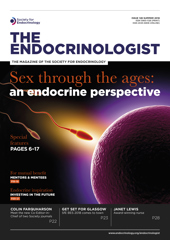Over the past two decades, we have seen an increase in testosterone prescribing worldwide. This is partly driven by increased awareness and identification of hypogonadism, but inappropriate use of testosterone in men without a clear antecedent diagnosis of hypogonadism has also contributed significantly to this phenomenon.
Several studies of testosterone replacement therapy (TRT) in men with so-called ‘classic’ primary or secondary hypogonadism have clearly demonstrated positive effects of testosterone replacement on body composition, muscle mass, bone mineral density and sexual function. However, significant concerns have been raised in more recent years over the potential cardiovascular (CV) risks associated with testosterone use, particularly in older men. Whilst data from retrospective epidemiological studies are largely conflicting, adequately powered randomised controlled trials to assess the long-term CV risks of TRT in men with low testosterone are simply lacking.
IDENTIFYING A RISK
The potentially heightened CV risk among some groups of men treated with testosterone first came to light in 2010. A randomised trial of testosterone therapy in older men with low testosterone (3.5–12.1nmol/l), impaired mobility and high co-morbidity burden (the Testosterone in Older Men with Sarcopenia (TOM) trial) was prematurely terminated, due to the higher frequency of CV-related adverse events in the testosterone-treated men compared with the placebo arm.1 The participants were, however, prescribed rather large doses of testosterone, and the risk of a CV event was greatest in men with testosterone levels in the highest quartile during the intervention period, as compared with all other subjects.
‘Significant concerns have been raised in more recent years over the potential cardiovascular risks associated with testosterone use, particularly in older men.’
Subsequently, Vigen and colleagues reported an association of TRT with increased risk of myocardial infarction (MI), stroke and all-cause mortality in a cohort of 8,709 men aged 60–64 years with low serum testosterone (<10.4nmol/l) who had undergone coronary angiography (hazard ratio 1.29; 95% CI 1.05–1.58).2 However, the study output was significantly influenced by the large number of questionable adjustments made to the analysis. The unadjusted analysis suggested that the rate of CV events was quite the opposite of what the study concluded: only 10.1% of men in the testosterone-treated group, as opposed to 21.2% in the untreated group, had a CV event. Similarly, Finkle et al., after examining the electronic records of 55,539 men who were prescribed testosterone, reported an increased relative risk of acute MI within 90 days of starting TRT compared with the rate of MI the year before (rate ratio 1.36; 95% CI 1.03–1.81).3 However, the absolute risk of developing acute MI following TRT initiation was very low, accounting for an additional 1.25 cases per 1,000 patient-years. Moreover, no information was provided regarding indications for testosterone treatment, including pretreatment testosterone level and presence of relevant symptoms. Therefore, it is unclear whether the treated men were indeed hypogonadal.
The studies by Vigen and Finkle have since received a significant amount of criticism, predominantly for their flawed design and methodology, as well as the reliability of the data presented and their interpretation.
EVIDENCE TO THE CONTRARY
Contrary to these studies, Shores and colleagues showed that TRT in men with low testosterone, including those with pre-existing ischaemic heart disease, was associated with reduced all-cause mortality compared with the untreated men (hazard ratio 0.61; 95% CI 0.42–0.88).4
Similarly, a number of meta-analyses investigating the association between TRT and major adverse cardiovascular events (MACE) and mortality in randomised controlled trials and observational studies showed no clear association between CV risk and testosterone use.5,6 The authors did, however, point out a significant clinical and methodological heterogeneity amongst the studies included in the meta-analyses, namely varied eligibility criteria, testosterone dosing and formulations, intervention duration, lack of large trial cohorts and a sufficient number of MACE. They concluded that, therefore, the overall evidence is rather limited and precludes a definitive conclusion regarding the adverse cardiovascular effects of testosterone.
IN PRACTICE
In response to mounting concerns, and based on available data, the US Food and Drug Administration issued a statement concluding that, despite conflicting evidence, there is a possibility of increased CV risk associated with testosterone use. Testosterone manufacturers were instructed to add information regarding a possible increased risk of MI and stroke in testosterone users to their labelling. The European Medicines Agency concluded that there is no consistent evidence of an increased risk of coronary heart disease associated with testosterone therapy in hypogonadal men.
Overall, the data on TRT and CV events are scant and of insufficient quality to draw definite conclusions on this important topic. An adequately powered randomised controlled trial is needed to address this specific concern. Until this is clarified, clinicians should offer testosterone treatment only to men with proven testosterone deficiency (i.e. consistently low morning serum testosterone and signs and symptoms of androgen deficiency) and be cautious in those with relevant co-morbidities.
Agnieszka Swiecicka, ST7 Endocrinology and Diabetes, and Clinical Research Fellow, Manchester University NHS Foundation Trust, and School of Medical Sciences, University of Manchester
REFERENCES
- Basaria S et al. 2010 New England Journal of Medicine 363 109–122.
- Vigen R et al. 2013 JAMA 310 1829–1836.
- Finkle WD et al. 2014 PLoS One 9 e85805.
- Shores MM et al. 2012 Journal of Clinical Endocrinology & Metabolism 97 2050–2058.
- Alexander GC et al. 2017 American Journal of Medicine 130 293–305.
- Fernández-Balsells MM et al. 2010 Journal of Clinical Endocrinology & Metabolism 95 2560–2575.






